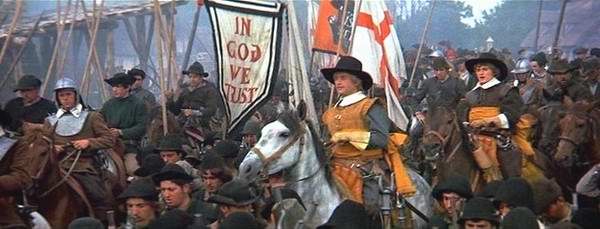
I love reading Knox for his fire and gravity. This, his preface to his most infamous work, is worth reading for many reasons but mostly as an insight into the reality Knox faced in his time. A reality we take for granted in our contemporary milieu (or as I would say we ignore).
The First Blast of the Trumpet
Against the Monstrous Regime of Women
The kingdom appertains to our God. [Psalm 22:28]
Wonder it is, that amongst so many pregnant wits as the isle of Great Britain has produced, so many godly and zealous preachers as England did sometime nourish, and amongst so many learned, and men of grave judgment, as this day by Jezebel are exiled, none is found so stout of courage, so faithful to God, nor loving to their native country, that they dare admonish the inhabitants of that isle, how abominable before God is the empire or rule of a wicked woman (yea, of a traitress and bastard); and what may a people or nation, left destitute of a lawful head, do by the authority of God's word in electing and appointing common rulers and magistrates. That isle (alas!) for the contempt and horrible abuse of God's mercies offered, and for the shameful revolting to Satan from Christ Jesus, and from his gospel once professed, does justly merit to be left in the hands of their own counsel, and so to come to confusion and bondage of strangers. [1]But yet I fear that this universal negligence of such as sometimes were esteemed watchmen shall rather aggravate our former ingratitude, than excuse this our universal and ungodly silence in so weighty a matter. We see our country set forth for a prey to foreign nations; we hear [of] the blood of our brethren, the members of Christ Jesus, most cruelly to be shed; and the monstrous empire [government] of a cruel woman (the secret counsel of God excepted) we know to be the only occasion of all those miseries; and yet with silence we pass the time, as though the matter did nothing appertain to us. [2]But the contrary examples of the ancient prophets move me to doubt of this our fact. For Israel did universally decline from God by embracing idolatry under Jeroboam in which they did continue even unto the destruction of their commonwealth (1 Kings 12:25-33). And Judah, with Jerusalem, did follow the vile superstition and open iniquity of Samaria (Ezek. 16). But yet the prophets of God ceased not to admonish the one and the other; yea, even after God had poured forth his plagues upon them. For Jeremiah did write to the captives in Babylon, and did correct their errors, plainly instructing them who did remain in the midst of that idolatrous nation (Jer. 29). Ezekiel, from the midst of his brethren (prisoners in Chaldea) did write his vision to those that were in Jerusalem; and, sharply rebuking their vices, assured them that they should not escape the vengeance of God, by reason of their abominations committed (Ezek. 7-9).
[3]The same prophets, for comfort of the afflicted and chosen saints of God, who did lie hid amongst the reprobate of that age (as commonly does the corn amongst the chaff), did prophesy and before speak the changes of kingdoms, the punishment of tyrants, and the vengeance which God would execute upon the oppressors of his people (Isa. 13; Jer. 46; Ezek. 36). [4]The same did Daniel, and the rest of the prophets, every one in their season. By whose examples, and by the plain precept which is given to Ezekiel (3"18-21), commanding him that he shall say to the wicked, "Thou shalt die the death," we in this our miserable age are bound to admonish the world, and the tyrants thereof, of their sudden destruction, to assure them and to cry unto them, whether they list or not, "that the blood of the saints, which by them is shed, continually crieth and craveth the vengeance in the presence of the Lord of Hosts" (Rev. 6:9-10). And further, it is our duty to open the truth revealed unto us, unto the ignorant and blind world; unless that, to our own condemnation, we list to wrap up and hide the talent committed to our charge.
I am assured that God has revealed to some in this our age, that it is more than a monster in nature that a woman shall reign and have empire above man. And yet, with us all there is such silence, as if God therewith were nothing offended. [5]I know the natural man, enemy to God, shall find many causes why no such doctrine ought to be published in these our dangerous days: first, for that it may seem to tend to sedition; secondarily, it shall be dangerous, not only to the writer or publisher, but also to all such as shall read the writings, or favour this truth spoken; and last, it shall not amend the chief offenders, partly because it shall never come to their ears, and partly because they will not be admonished in such cases.
I answer, if any of these be a sufficient reason, that a known truth shall be concealed, then were the ancient prophets of God very fools, who did not better provide for their own quietness, than to hazard their lives for rebuking of vices, and for the opening of such crimes as were not known to the world. And Christ Jesus did injury to his apostles, commanding them to preach repentance and remission of sins in his name to every realm and nation. And Paul did not understand his own liberty, when he cried, "Woe be to me, if I preach not the evangel!" (1 Cor. 9:16). If fear, I say, of persecution, of slander, or of any inconvenience before named, might have excused and discharged the servants of God from plainly rebuking the sins of the world, just cause had every one of them to have ceased from their office. For suddenly their doctrine was accused by terms of sedition, of new learning, and of treason. Persecution and vehement trouble did shortly come upon the professors with the preachers. Kings, princes, and worldly rulers did conspire against God, and against his anointed Christ Jesus (Matt. 26:57-68; Acts 18:12-16; 21:28-39; Ps. 2; Acts 4:1-33).
But what? Did any of these move the prophets and apostles to faint in their vocation [calling]? No. But by the resistance (which the devil made to them by his supporters) were they the more inflamed to publish the truth revealed unto them, and to witness with their blood, that grievous condemnation and God's heavy vengeance should follow the proud contempt of graces offered. The fidelity, bold courage, and constancy of those that are passed before us, ought to provoke us to follow in their footsteps, unless we look for another kingdom than Christ has promised to such as persevere in profession of his name to the end.
If any think that the empire of women is not of such importance, that for the suppressing of the same any man is bound to hazard his life: I answer, that to suppress it is in the hand of God alone. [6]But to utter the impiety and abomination of the same, I say, it is the duty of every true messenger of God to whom the truth is revealed in that behalf. [7]For the especial duty of God's messengers is to preach repentance, to admonish the offenders of their offenses, and to say to the wicked, "Thou shalt die the death, except thou repent." This, I trust, no man will deny to be the proper office of all God's messengers, to preach (as I have said) repentance and remission of sins. But neither of both can be done, except the conscience of the offenders be accused and convicted of transgression. But how shall any man repent, not knowing wherein he has offended? And where no repentance is found, there can be no entry to grace. And therefore, I say, that of necessity it is that this monstiferous empire of women (which amongst all enormities that this day do abound upon the face of the whole earth, is most detestable and damnable) be openly revealed and plainly declared to the world, to the end that some may repent and be saved. And thus far to the first sort.
To such as think that it will be long before such doctrine comes to the ears of the chief offenders, [8]I answer, that the verity of God is of that nature, that at one time or at another it will purchase to itself audience. It is an odor [aroma] and smell that cannot be suppressed. Yea, it is a trumpet that will sound in despite of the adversary. It will compel the very enemies, to their own confusion, to testify and bear witness of it. For I find that the prophecy and preaching of Elijah were declared in the hall of the king of Syria, by the servants and flatterers of the same wicked king, making mention that Elijah declared to the king of Israel whatsoever the said king of Syria spoke in his most secret chamber (2 Kings 6:12). And the wondrous works of Jesus Christ were notified to Herod, not in any great praise or commendation of his doctrine, but rather to signify that Christ called that tyrant a fox, and that he did no more regard his authority than did John the baptist, whom Herod before had beheaded for the liberty of his tongue (Matt. 14:1-2).
But whether the bearers of the rumours and tidings were favourers of Christ, or flatterers of the tyrant, certain it is that the fame, as well of Christ's doctrine as of his works, came to the ears of Herod. Even so may the sound of our weak trumpet, by the support of some wind (blow it from the south, or blow it from the north, it is no matter), come to the ears of the chief offenders. But whether it does or not, yet dare we not cease to blow as God will give strength (Rom. 1:15-17). [9]For we are debtors to more than princes: to wit, to the multitude of our brethren, of whom, no doubt, a great number have heretofore offended by error and ignorance, giving their suffrages, consent, and help to establish women in their kingdoms and empires, not understanding how abominable, odious, and detestable is all such usurped authority in the presence of God. And therefore must the truth be plainly spoken, that the simple and rude multitude may be admonished.
And as concerning the danger which may hereof ensue, I am not altogether so brutish and insensible, but that I have laid my account, what the finishing of the work may cost me for my own part. [10]First, I am not ignorant how difficult and dangerous it is to speak against a common error, especially when the ambitious minds of men and women are called to the obedience of God's simple commandment. For to the most part of men, whatsoever antiquity has received appears lawful and godly. And secondarily, I look to have more adversaries, not only of the ignorant multitude, but also of the wise, politic, and quiet spirits of the world so that as well shall such as ought to maintain the truth and verity of God become enemies to me in this case, as shall the princes and ambitious persons who, to maintain their unjust tyranny, do always study to suppress the same. And thus I am most certainly persuaded that my labour shall not escape reprehension of many.
[11]But because I remember that account of the talents received must be made to him who neither respects the multitude, neither yet approves the wisdom, policy, peace, nor antiquity, concluding or determining anything against his eternal will, revealed to us in his most blessed word I am compelled to cover my eyes, and shut up my ears, that I neither see the multitude that shall withstand me in this matter, neither that I shall hear the opprobrium, nor consider the dangers which I may incur for uttering the same. I shall be called foolish, curious, despiteful, and a sower of sedition; and one day, perchance (although now [I] am nameless) I may be attainted [condemned] of treason. [12]But seeing that it is impossible, but that either I shall offend God, daily calling to my conscience that I ought to manifest the known verity; or else that I shall displease the world for doing the same; I have determined to obey God, notwithstanding that the world shall rage thereat.
I know that the world offended (by God's permission) may kill the body; but God's majesty offended has power to punish body and soul for ever. His majesty is offended when his precepts are contemned and his threatenings esteemed to be of none effect. And amongst his manifold precepts given to his prophets, and amongst his threatenings, none is more vehement than is that which is pronounced by Ezekiel in these words: "Son of man, I have appointed thee a watchman to the house of Israel, that thou shouldest hear from my mouth the word; and that thou mayest admonish them plainly, when I shall say to the wicked man, 'O wicked, thou shalt assuredly die.' Then if thou shalt not speak, that thou mayest plainly admonish him that he may leave his wicked way, the wicked man shall die in his iniquity; but his blood will I require of thy hand. But and if thou shalt plainly admonish the wicked man, and yet he shall not turn from his way, such a one shall die in his iniquity; but thou hast delivered thy soul" (Ezek. 33:7-9).
This precept, I say, with the threatening annexed, together with the rest that is spoken in the same chapter, not to Ezekiel only, but to every one whom God places watchman over his people and flock (and watchmen are they, whose eyes he does open, and whose conscience he pricks to admonish the ungodly), compels me to utter my conscience in this matter, notwithstanding that the whole world should be offended with me for so doing. [13]If any wonder why I do conceal my name, let him be assured that the fear of corporeal punishment is neither the only, neither the chief cause. My purpose is thrice to blow the trumpet in the same matter, if God so permits. Twice I intend to do it without name; but at the last blast to take the blame upon myself, that all others may be purged.












4 comments:
Since this was written by Knox in 1557, probably in Dieppe accoring to Ridley's Biography of Knox; it was written as an attack on Queen Mary of England.
According to Ridley:
" (Knox) preferred the company and friendship of women to the company of men. ... In view of Knox's attitude toward women there is every indication that he wrote The First Blast because he decided, at Dieppe in the autumn of 1557, to pander to popular prejudices which he personally did not really share, though there were plenty of biblibal texts with which he could justify his arguments to himself, as well to his readers.
When Knox published The First Blast, he was fully aware that it would lead him into serious trouble. He also knew that Calvin would not approve of it."
Ridley, John Knox Oxford Univ Press 1968 pp 265-266.
So ... are you saying that what pertained to Queen Mary, would also pertain to any women in government, or elsewhere ??
Draw your own conclusions ;)
Unfortunately for Ben Queen Mary was a relative of his and is in a historical context Hillery not withstanding.
Ouch ....
Post a Comment